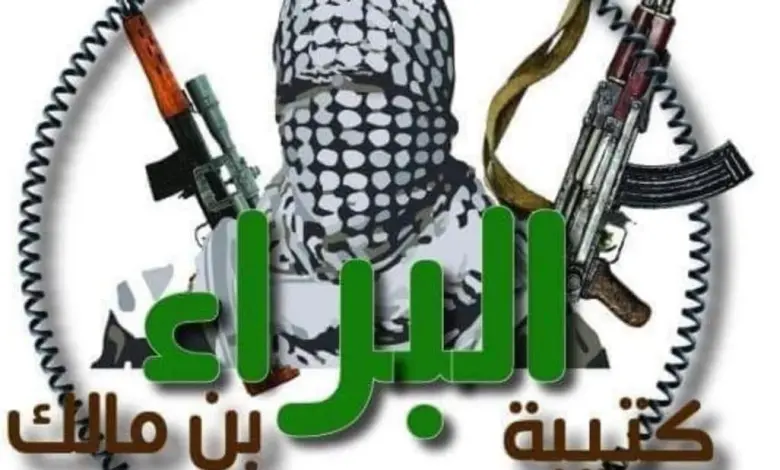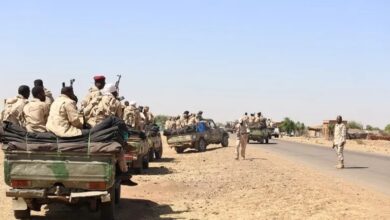Al-Baraa Brigade: A Shortage of fighters or a new escalation?!
Report: Monem Suleiman

Last week, an audio recording of one of the leaders of “Al-Bara’ Ibn Malik Brigade” was widely circulated through various media outlets, a militia among the “shadow battalions” affiliated with the Sudanese Islamic Movement, which made an appearance in the military arena with the outbreak of the war between the Sudanese Army and the Rapid Support Forces on April 15th, 2023.
The recording offered an invitation to the Sudanese residing outside the country to join the ranks of the brigade as “mujahideen” in the war against the Rapid Support Forces, indicating that facilities would be provided to those wishing to do so, including airline tickets, accommodations, meals, as well as military training.
The recording also referred to resolving any problems related to travel or residence documents, which usually falls within the jurisdiction of the Sudanese Embassies and Consulates, highlighting the coordination between the Islamic Movement and the Ministry of Foreign Affairs, which is widely rumored to be managed by the Movement’s Secretary-General, Ali Karti, behind the scenes.
Hours after the recording was published, the leader of the Al-Bara’ Brigade militia, “Almusbah Abuzaid Talha,” wrote a post on Facebook, calling on the Sudanese to participate in the fight, in which he stated: “Are there any other excuses for anyone not to participate ?” in an explicit reference to providing facilities for recruiting Sudanese abroad.
Background on Shadow Battalions and the Emergence of Al-Bara’ Ibn Malik:
The Sudanese public first heard about the “Shadow Battalions” after the outbreak of the popular revolution in December (2018), when Ali Osman Mohamed Taha, the former Secretary-General of the Islamic Movement, made threatening statements against the demonstrators, saying: “We have shadow battalions that you are well aware of.” After the success of the revolution, the battalions’ reputation deteriorated, and they were further removed from the direct military scene.
They began working undercover to undermine the transitional government and create internal crises with the aim of obstructing the democratic transition. They also established electronic battalions that worked to spread rumors and incitement via social media, especially on Facebook.
When the October 25th, 2021 Coup led by the Army Commander-in-Chief Abdel Fattah al-Burhan took place, with the Islamists’ support, the Shadow Battalions made an appearance in public again, supporting the coup and expressing their support.
Following the outbreak of the April 15th, 2023 war, Al-Bara’ Ibn Malik Brigade officially announced itself, boasting of its heavy weapons and military uniforms, in a clear indication of support for the Army against the Rapid Support Forces.
Implications of Al-Bara’ Brigade’s Invitation:
The Brigade’s call to the Sudanese abroad indicates two main possibilities: The first of which is that, the Brigade has suffered heavy losses against the Rapid Support Forces, which led to a decline in the number of its recruits, especially after its attempt to advance to “Al-Muqran” area in central Khartoum at the beginning of last month, which failed and led to the death of numerous brigade members. This was clearly evident in the obituary announcements that followed the attempt to control Al-Muqran.
The second possibility is the failure of the mobilization call and all efforts to recruit civilians inside Sudan, despite the intensive media promotion about thousands being willing to fight against the Rapid Support Forces.
In another context, the Commander had previously announced -last April- that the number of members had risen to (21,000) soldiers, which prompted him to announce its transformation into a brigade, invoking questions in regards to the fate of this large number of soldiers, and whether they were all killed in the war against the Rapid Support Forces, and if that is the reason behind the brigade issuing recruitment calls.
Islamists’ Control over the Sudanese Army:
Following the 1989 Coup, the Islamic Movement has worked to control the Army and transform it into an ideological Army loyal to it, through a series of measures that included referring thousands of patriotic officers to retirement, replacing them with students loyal to the Islamic Movement right after Military and war academies, and excluding officers who didn’t belong to the Islamic Movement.
The result of the aforementioned efforts was an Army with a dysfunctional structure and ideology, loyal to the ideology of the Muslim Brotherhood, which complicated the Army’s situation and affected its national structure and military doctrine.
A Historical Overview of the Islamists’ Influence Within the Army:
Ali Karti, the current Secretary-General of the Islamic Movement, is considered one of the most prominent figures who worked to “Islamize” the Army, transforming it from a national Army into ideological partisan forces affiliated with the Islamic Movement. Karti, along with Ahmed Mohamed Ali Al-Fashashwiya and Al-Zubair Ahmed Al-Hassan, were at the forefront of those responsible for establishing the Islamic Military Organization within the Military and Security Services. Their efforts focused on introducing individuals loyal to the Islamic Movement into the Security and Military Services, which strengthened the authority of the Islamists within these Services, especially within the Army, prompting them to invoke military loyalty to the organization.
After the fall of Omar Al-Bashir’s regime, most of the leaders of the Islamic Movement were arrested, with the exception of Ali Karti, who maintained his freedom due to his wide influence among Army and Police officers, as well as the Intelligence Service. Karti continued to expand his military control after the October 25th, 2021 Coup, as he supervised the process of preventing Army leaders from signing the “Framework Agreement,” and played the largest role in planning the April 15th, 2023 war.
In Conclusion:
This report reveals the dimensions of the growing role played by the “shadow battalions” and their impact on the current military and political scene. The emergence of these battalions, their participation in the war, and their repeated calls for recruitment among civilians, both from within and outside Sudanese borders, are evidence of the depth of the crisis and the extent of Islamists’ control over the Army and State Services.
It also reflects the desire of the Islamist Movement to continue the war and impose impossible military solutions in order to return to power again, in a country whose political and military map has changed, and is in desperate need of a national will and unified military institution that transcends partisan loyalties to lead the State to sustainable democratic civilian rule, which casts a heavy shadow over the future of security and stability in Sudan.





